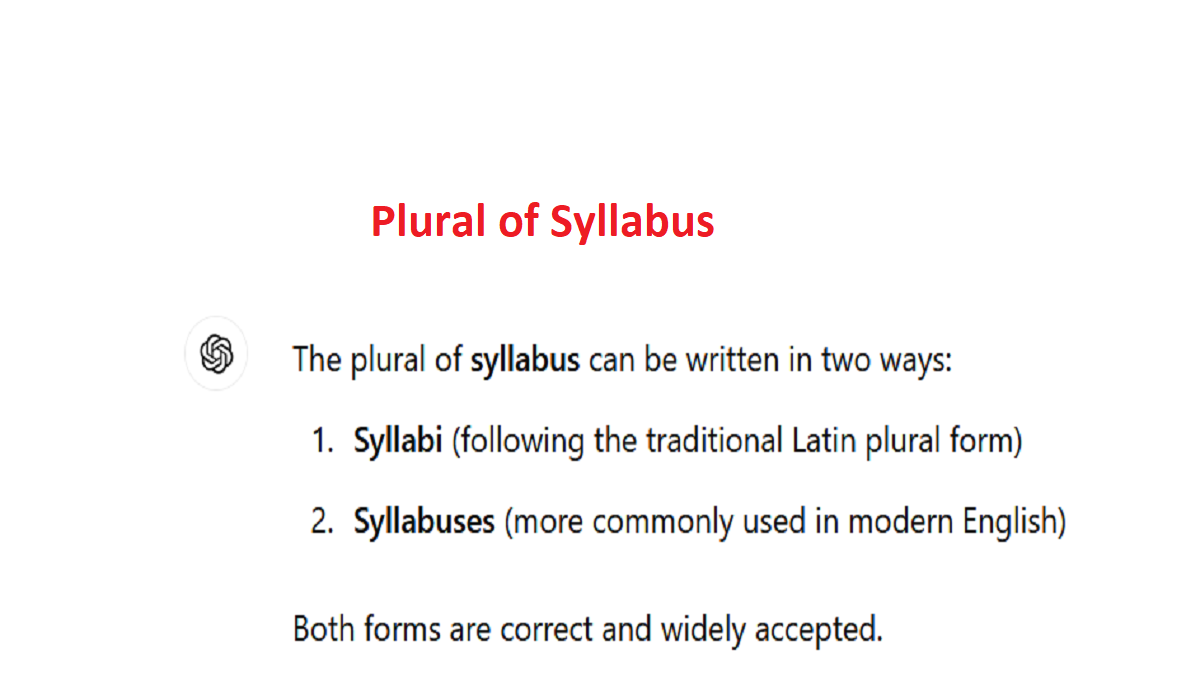The plural form of “syllabus” is commonly written as “syllabi” or “syllabuses.” “Syllabi” comes from the Latin origin of the word, following traditional pluralization rules for Latin-derived nouns. However, “syllabuses” is also correct and widely accepted in modern English, as it conforms to regular English pluralization rules. Both forms are correct, but “syllabi” is often preferred in academic contexts, while “syllabuses” is used in general or informal writing. When referring to multiple course outlines, either term can be used based on personal or regional preference, with “syllabi” adding a formal touch. Check Real Plural of Syllabus.
What is the Plural of Syllabus
The plural of “syllabus” can be expressed in two forms:
- Syllabuses – This is the more modern and commonly accepted plural form, following the general English rule for plurals by adding “-es” to words ending in “s.”
- Syllabi – This form is based on the Latin origin of the word “syllabus.” In classical Latin, nouns ending in “-us” often change to “-i” in the plural form. Although “syllabus” itself might be a misinterpretation from early Latin texts, “syllabi” has been widely accepted in academic and formal contexts.
Usage and Context
- Syllabuses is more commonly used in general English-speaking contexts, especially in informal settings, and is becoming more standard in education and business.
- Syllabi is often used in more formal, academic, or traditional contexts, especially in the United States, where Latin-based plurals are still popular in certain academic environments.
Examples
- Syllabuses: “The teachers have prepared their syllabuses for the new semester.”
- Syllabi: “The university department reviewed all syllabi for the accreditation process.”
Both are grammatically correct, so you can choose based on your preference or the formality of the setting!
Is it syllabuses or syllabi?
A syllabus is the course outline that you are given at the start of the course. The word sounds authoritative and intellectual, although it is most often the result of a misunderstanding.
The term “syllabus” comes from New Latin, possibly from a misunderstanding of the Greek word “síttybās” in Cicero’s manuscripts. This phrase refers to a label on a papyrus roll, indicating the title and author.
Syllabus is an example of a Latin word that ends in -us and is pluralized by replacing the -us with -i. Many English words with strong Latin roots, such as alumnus/alumni and stimulus/stimuli, still use this pluralization pattern.
In terms of syllabus, both syllabi and standard plural syllabuses are often employed.
There are a few more examples of Latin-derived names with both endings, including octopuses/octopi, platypuses/platypi, cactuses/cacti, and thesauruses/thesauri.
However, in all of these circumstances, it is more customary to pluralize with a simple -es. But that doesn’t mean either one is wrong or “more correct.” Both syllabuses and syllabi are completely permissible.
Perhaps the best option is to utilize the term that your professor uses. You can also bypass the issue altogether by simply referring to them as course outlines.

